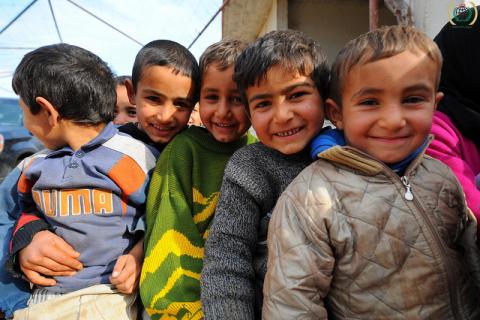
The following article appeared in the September-October 2013 issue of NewsNotes.
As NewsNotes goes to press in early September, the news cycle is dominated by discussion about a possible military strike against Syria; President Obama is trying to gain support for the strike as the appropriate response to the Syrian government’s use of chemical warfare against its citizens on August 21. Congress is debating use of force, and other nations are weighing in with their positions.
On September 1, Pope Francis spoke directly to the tragedy in Syria. He announced a day of fasting and prayer, to be held on Saturday, September 7: "We will gather in prayer and in a spirit of penance, invoking God’s great gift of peace upon the beloved nation of Syria and upon each situation of conflict and violence around the world ... Humanity needs to see these gestures of peace and to hear words of hope and peace." (Fasting for a day requires adult Catholics in good health to limit themselves to one meal.)
Pope Francis said everyone was invited, "including our non-Catholic Christian brothers [and sisters], followers of other religions and all [people] of good will, to participate, in whatever way they can, in this initiative."
On August 31, Pax Christi USA released a statement (written in collaboration with Scott Wright) that said, in part: "No one questions the obscenity of murdering a thousand people – many of them children – with poison gas, nor the moral indignation that people around the world feel at this atrocity and crime against humanity. The more than 100,000 deaths from two years of a cruel fratricidal war in Syria, and the cruelty of the Bashar al-Assad regime against its own people, speak to the obscenity of war.
"What many do question, however, including military veterans in Congress, is the wisdom of a military strike by the U.S. in Syria. The wars in Afghanistan and Iraq also began with military strikes, caused the destruction of hundreds of thousands of Afghan, Iraqi, and American lives, and lasted more than a decade after 9/11. ...
"This is a crucial moment in history – and the U.S. can pursue the path of war, or the path of dialogue and negotiations, of true peacemaking. But the churches and people of all faith traditions should be leading the way, with our voices and by our witness.
"Before we add more fuel to the fire, and to ‘the endless and horrifying sequence of wars, conflicts, genocides and "ethic cleansings" which have caused unspeakable suffering; millions and millions of victims, families and countries destroyed, an ocean of refugees, misery, hunger, disease, underdevelopment and the loss of immense resources,’ – words of John Paul II – we ought to question the wisdom of a military strike in Syria and heed John Paul’s warning:
"‘The twentieth century bequeaths to us above all else a warning: wars are often the cause of further wars because they fuel deep hatreds, create situations of injustice and trample upon people’s dignity and rights… War is a defeat for humanity. Only in peace and through peace can respect for human dignity and its inalienable rights be guaranteed.’"
Faith in action:
The following alert was prepared by the Justice and Peace office of the Conference of Major Superiors of Men (CMSM).
Please encourage your representative and senators to oppose U.S. military action in Syria and support sustained diplomacy. Call your representative and senators today. Here are some points to make in your call:
- I oppose U.S. military action in Syria.
- The U.S. does need to act. I encourage the [senator/representative] to support increased diplomacy, the convening of an international summit of heads of state to negotiate a just peace, explore restorative justice responses, and pressure on Saudi Arabia, Qatar, and Turkey to reduce the arms to the resistance as a signal to Russia and Iran to reduce their arms to Assad.
- Can you tell me about the [senator/representative]’s stance on stopping the violence in Syria?
The world community needs to act urgently to bring those responsible for using chemical weapons - and anyone who commits war crime - to a process of restorative justice. But U.S. military action will hurt more than help, increasing hostility, violence, and the risk of more chemical weapons attacks.
Instead, President Obama should engage diplomatically with all parties in the region and convene an emergency summit of heads of state, press the UN Security Council to ask the International Criminal Court to investigate all war crimes in Syria.
If you use Twitter, please look up the Twitter handles (http://www.tweetcongress.org) for your representative and senators and send them this message: @[Your representative’s handle]: Don’t bomb #Syria. Instead nonviolence, emergency summit, restorative justice, and reduce arms flow bit.ly/16Rj6eV
Photo of Syrian refugee children by the Turkish NGO IHH Humanitarian Relief Foundation (İHH İnsani Yardım Vakfı)
